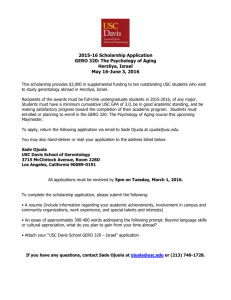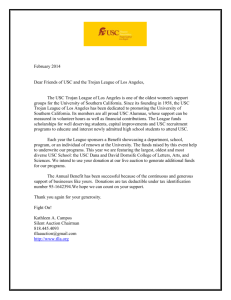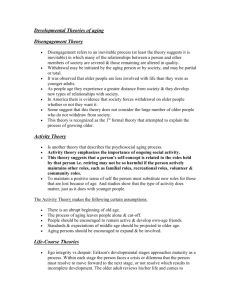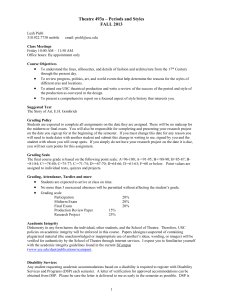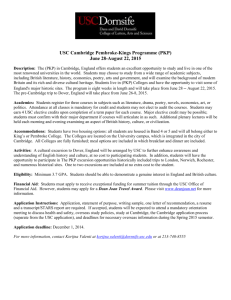BISC461 Seminar in Molecular and Computational Biology: Sex
advertisement
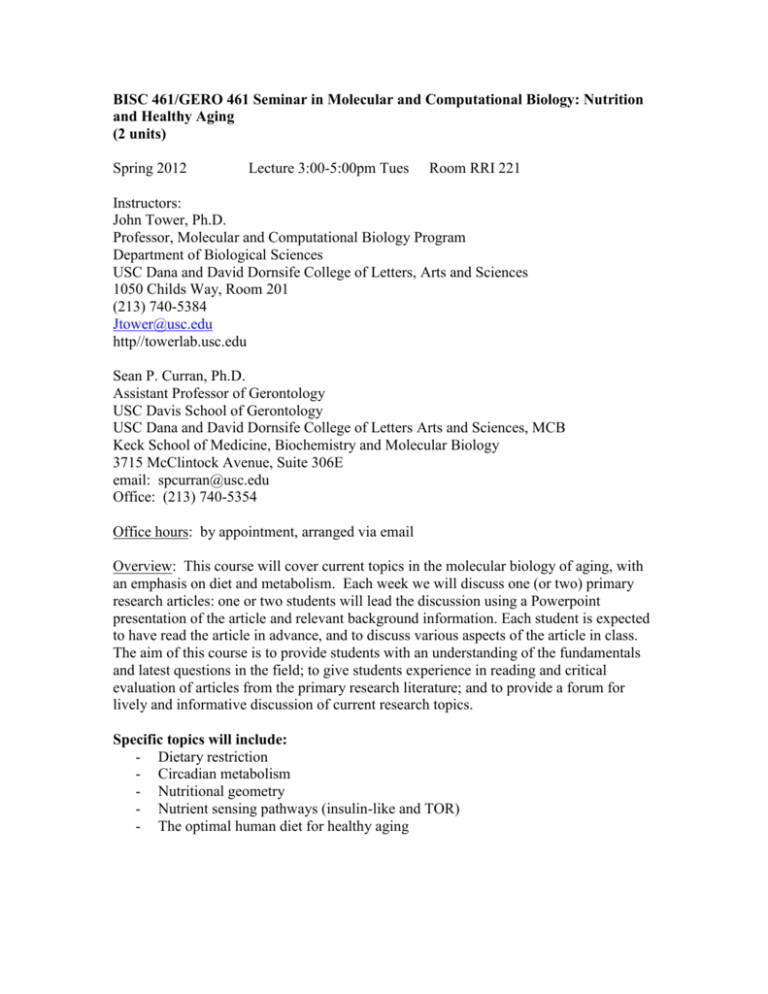
BISC 461/GERO 461 Seminar in Molecular and Computational Biology: Nutrition and Healthy Aging (2 units) Spring 2012 Lecture 3:00-5:00pm Tues Room RRI 221 Instructors: John Tower, Ph.D. Professor, Molecular and Computational Biology Program Department of Biological Sciences USC Dana and David Dornsife College of Letters, Arts and Sciences 1050 Childs Way, Room 201 (213) 740-5384 Jtower@usc.edu http//towerlab.usc.edu Sean P. Curran, Ph.D. Assistant Professor of Gerontology USC Davis School of Gerontology USC Dana and David Dornsife College of Letters Arts and Sciences, MCB Keck School of Medicine, Biochemistry and Molecular Biology 3715 McClintock Avenue, Suite 306E email: spcurran@usc.edu Office: (213) 740-5354 Office hours: by appointment, arranged via email Overview: This course will cover current topics in the molecular biology of aging, with an emphasis on diet and metabolism. Each week we will discuss one (or two) primary research articles: one or two students will lead the discussion using a Powerpoint presentation of the article and relevant background information. Each student is expected to have read the article in advance, and to discuss various aspects of the article in class. The aim of this course is to provide students with an understanding of the fundamentals and latest questions in the field; to give students experience in reading and critical evaluation of articles from the primary research literature; and to provide a forum for lively and informative discussion of current research topics. Specific topics will include: - Dietary restriction - Circadian metabolism - Nutritional geometry - Nutrient sensing pathways (insulin-like and TOR) - The optimal human diet for healthy aging Course materials: There is no text for this course. Papers for discussion, Powerpoint presentations, and other materials will be posted on Blackboard at http://blackboard.usc.edu/ Students will have the opportunity to select specific papers for presentation: Papers for presentation will be selected in consultation with the professor, and must be approved by the professor. EXAMPLE PAPERS Jan 10 Pleiotropic effects of growth hormone signaling in aging. Bartke A. Trends Endocrinol Metab. 2011 Aug 16 Jan 17 Calorie restriction and prevention of age-associated chronic disease. Omodei D, Fontana L. FEBS Lett. 2011 Jun 6;585(11):1537-42. Epub 2011 Mar 12. Jan 24 Inflammation and infection do not promote arterial aging and cardiovascular disease risk factors among lean horticulturalists.Gurven M, Kaplan H, Winking J, Eid Rodriguez D, Vasunilashorn S, Kim JK, Finch C, Crimmins E. Jan 31Genetics of aging. Finch CE, Tanzi RE. Science. 1997 Oct 17;278(5337):407-11. Feb 7 Telomeres and lifestyle factors: Roles in cellular aging. Lin J, Epel E, Blackburn E. Mutat Res. 2011 Aug 22 Feb 14 The chronological life span of Saccharomyces cerevisiae. Fabrizio P, Longo VD. Methods Mol Biol. 2007;371:89-95. Feb 21The trifecta of aging in Caenorhabditis elegans. Wolff S, Dillin A. Exp Gerontol. 2006 Oct;41(10):894-903. Epub 2006 Aug 21 Feb 28 Heat shock proteins and Drosophila aging. Tower J. Exp Gerontol. 2011 May;46(5):355-62. Epub 2010 Sep 16 Mar 6 Lifespan regulation by evolutionarily conserved genes essential for viability. Curran SP, Ruvkun G. PLoS Genet. 2007 Apr 6;3(4):e56. Epub 2007 Feb 27 Mar 13 – no class, Spring recess Mar 20 The first long-lived mutants: discovery of the insulin/IGF-1 pathway for ageing. Kenyon C. Philos Trans R Soc Lond B Biol Sci. 2011 Jan 12;366(1561):9-16. Review. Mar 27 Hot topics in aging research: protein translation and TOR signaling, 2010. Kaeberlein M, Kennedy BK. Aging Cell. 2011 Apr;10(2):185-90 April 3 Lifestyle factors of people with exceptional longevity. Rajpathak SN, Liu Y, BenDavid O, Reddy S, Atzmon G, Crandall J, Barzilai N. J Am Geriatr Soc. 2011 Aug;59(8):150912. April 10 Genetic studies reveal the role of the endocrine and metabolic systems in aging. Barzilai N, Gabriely I, Atzmon G, Suh Y, Rothenberg D, Bergman A. J Clin Endocrinol Metab. 2010 Oct;95(10):4493-500. April 17 Geriatric drug evaluation: where are we now and where should we be in the future?Cho S, Lau SW, Tandon V, Kumi K, Pfuma E, Abernethy DR.Arch Intern Med. 2011 May 23;171(10):937-40 April 24 Lifestyle factors of people with exceptional longevity. Rajpathak SN, Liu Y, BenDavid O, Reddy S, Atzmon G, Crandall J, Barzilai N. J Am Geriatr Soc. 2011 Aug;59(8):150912. Final Exam: Presentations Class participation Final exam Total: 80 10 10 100 pts Letter grades are determined by a curve based upon total points. No “extra credit” work is available under any circumstances. It is possible for every student to receive a grade of A if every student does well in the course. EXAMS: Exams must be completed in non-erasable pen. Exams will have specific questions about lecture material and general questions about other material in the readings. No one will be admitted late to an exam after the first student has left the room. MISSED EXAMS: It is your responsibility to make it to exams. If you miss an exam without arranging it first with the instructor, you will receive 0 points for that exam. Illness will generally not be accepted as a reason for missing an exam. If you were ill to the point that you could not attend the exam you must have documentation from the physician so that we can call them and verify that you actually saw that physician on that date. Any other excuse will be considered only if you have documentation that we can verify, and will be accepted only if we feel your absence was unavoidable: e.g., missing an exam because of bad traffic = zero points. To be considered, any documentation of the reason for your absence must be presented within one week of the missed exam. Makeup exams may be either oral or written at the discretion of the professor. * It may be necessary to make some adjustments to the syllabus during the semester. Statement for Students with Disabilities Any student requesting academic accommodations based on a disability is required to register with Disability Services and Programs (DSP) each semester. A letter of verification for approved accommodations can be obtained from DSP. Please be sure the letter is delivered to Dr. Tower as early in the semester as possible. DSP is located in STU 301 and is open 8:30 a.m.–5:00 p.m., Monday through Friday. The phone number for DSP is (213) 740-0776. Statement on Academic Integrity USC seeks to maintain an optimal learning environment. General principles of academic honesty include the concept of respect for the intellectual property of others, the expectation that individual work will be submitted unless otherwise allowed by an instructor, and the obligations both to protect one’s own academic work from misuse by others as well as to avoid using another’s work as one’s own. All students are expected to understand and abide by these principles. Scampus, the Student Guidebook, contains the Student Conduct Code in Section 11.00, while the recommended sanctions are located in Appendix A: http://www.usc.edu/dept/publications/SCAMPUS/gov/. Students will be referred to the Office of Student Judicial Affairs and Community Standards for further review, should there be any suspicion of academic dishonesty. The Review process can be found at: http://www.usc.edu/student-affairs/SJACS/.


